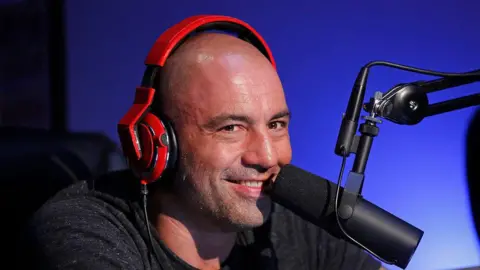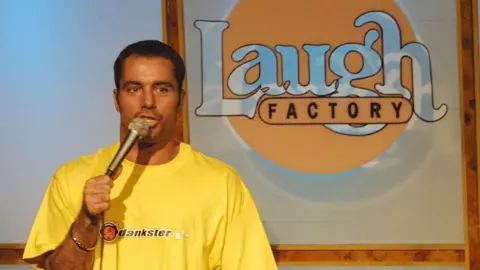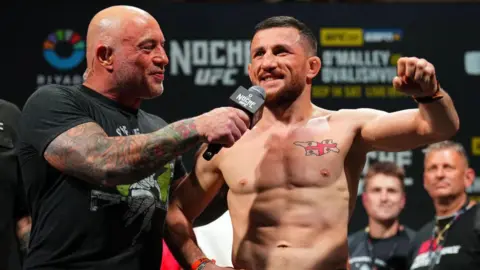Republican presidential candidate Donald Trump is about to do one of the biggest interviews of his presidential campaign – with America’s number one podcaster, Joe Rogan.
With 14.5 million Spotify followers and 17.5 million YouTube subscribers, The Joe Rogan Experience (JRE for short) has built a massive, mostly male, audience since it first launched 15 years ago.
Confirming media reports of the upcoming interview, set to be taped on Friday, Trump described his counterpart as “a nice guy” with whom he expected a “very interesting” conversation.
“I do a lot of shows,” he told Fox News Radio on Wednesday. “Good, bad or indifferent. I do a lot of shows and they come out good.”
That response makes light of the Trump campaign’s calculated media strategy, which has focused on podcasts popular with younger men over traditional media outlets like 60 Minutes.
And it underplays just how big a deal this could be for the former president, long-time listeners say.
“Rogan is about to have the most listened-to podcast in human history,” says Matthew Foldi, a conservative journalist and self-styled JRE expert who has spent thousands of hours listening to the entire catalogue – in chronological order and at 3.5x speed – since 2020.
 Getty Images
Getty ImagesWho is Joe Rogan?
A New Jersey native, Rogan began his career as a stand-up comedian in the Boston area before relocating to California in the 1990s. He featured in two sitcoms – Hardball and NewsRadio – and gained national exposure as host of the US edition of the Fear Factor game show.
He became one of the first comics to venture into podcasting in 2009, quickly building an audience with his easy-going conversation style and sense of humour. By 2020, he had signed one of the largest licensing deals in the business, with Spotify, where he has dominated the podcasting ranks.
Known for discussing everything from current affairs and politics to aliens and drug use, Rogan hosts an ideologically diverse mix of guests – from astrophysicist Neil DeGrasse Tyson to far-right conspiracy theorist Alex Jones to comedians like Chris Rock and Kevin Hart – in lengthy hours-long interviews.
Part of his appeal, says Kat Rosenfield, a freelance culture writer and novelist, is his willingness to talk to anyone, about anything.
“He is very naturally curious. He wants to ask questions. He wants to know what’s up with his guests and he has good instincts to make it an engaging listen.”
 Getty Images
Getty ImagesBut his willingness to absorb contrarian perspectives has also landed him in hot water.
During the Covid-19 pandemic, he was criticised for promoting vaccine scepticism, leading to a coalition of medical experts to call out Spotify for allowing “false and societally harmful assertions” to spread.
In 2022, musicians Neil Young and Joni Mitchell removed their music from Spotify in protest over Rogan’s use of the platform to spread alleged Covid misinformation. The company ultimately took down some 70 previously-released episodes.
Also that year, Rogan came under fire when a video compilation of him repeatedly using racially insensitive language on his show made the rounds on social media. He has since apologised.
Ms Rosenfield casts Rogan’s personal politics as being libertarian – very socially liberal, as seen in his support for same-sex marriage and universal drug legalisation, but also someone who treasures free speech and gun rights.
In 2020, he endorsed Bernie Sanders for president after the then-Democratic candidate appeared on his show.
“Rogan seemed like a refreshing alternative at a moment when audiences sort of lost their trust in many [mainstream media] outlets,” Ms Rosenfield argues.
“He doesn’t think he’s smarter than his audience, which I think is quite endearing to people who listen to the show. He doesn’t talk down to people and he always says ‘don’t listen to me, I don’t know anything’.”
Trump v Rogan
Trump and Rogan have not always seen eye-to-eye.
As recently as 2022, the podcaster said he did not want to “help” Trump electorally because he was “an existential threat to democracy”.
Earlier this year, he praised Robert F Kennedy Jr, then running as an independent presidential candidate, as “the only one that makes sense to me”.
That didn’t go down well with Trump, who said Rogan would get “booed” the next time he was at an Ultimate Fighting Championship (UFC) event.
But it’s also their shared love of the UFC, and mixed martial arts in general, hints at some of the common ground they may have during the interview.
Rogan is a long-time colour commentator and interviewer for the Ultimate Fighting Championship (UFC) events. Trump, too, is a fan of the sport, which he has discussed at length on other podcasts.
The two are both long-time friends of UFC CEO Dana White, who lauded Rogan this week as “the best combat sports commentator of all time” and has lavished praise on Trump as “the ultimate American badass”.
They also share two other allies – RFK Jr and Elon Musk, both of whom have recently got behind Trump.
Rogan spoke fondly of Trump on a recent show as a “wheeling, dealing billionaire character that everybody enjoyed” whose deregulation agenda had helped the economy.
He added that the wars in Ukraine and Gaza “scared the [expletive] out of him” – two wars Trump has vowed to end if elected, although he has not provided specifics on how.
 Getty Images
Getty ImagesA perfect match?
Mr Foldi, the conservative journalist and Rogan super fan, says the attention that Trump will get from this podcast could help him dominate the closing days of the campaign and win over straggling undecided voters.
“This is the most viewed show on earth, and the eyeballs that you’re going to get… is second to none.”
Like Mr Foldi, who is 28, Rogan’s listeners are overwhelmingly young and male. Almost 80% are men, and half are between the ages of 18 and 34, according to Edison Research, which produces survey-based data on podcasting in the US.
Such figures suggest Rogan’s audience is part of a crucial voting bloc to whom the Trump campaign has made clear it is trying to reach. In August, the campaign told reporters it is focused on persuading a group of voters it says makes up about 10% of the electorate in key swing states. This group is disproportionately young, male and racially diverse.
Cancelling traditional media interviews with the likes of CBS and NBC, Trump has instead spent time with podcasters who appeal to predominantly male audiences, including comedians Andrew Schulz and Theo Von, social media influencer Logan Paul, retired wrestler Mark Calaway (AKA The Undertaker) and YouTube pranksters The Nelk Boys. But in sheer audience size and cultural reach, JRE is arguably the lynchpin of this podcast tour.
Harris too has made podcasts part of her media blitz, albeit to a lesser extent. She sat down earlier this month with Call Her Daddy – the top-ranked show among women – and spoke at length with host Alex Cooper about reproductive rights, the top issue galvanising Democrats and particularly female voters this year.
About the same time that Rogan’s episode is airing, Harris is scheduled to sit down with famed social psychologist Brene Brown for her podcast, Unlocking Us, which is also popular with female listeners.
In spite of objections from some corners, Harris’s team reportedly met with Rogan’s staff last week, according to Reuters, but no appearance on the show has been announced.
As anticipation for the Trump interview builds, Americans on social media are fantasising about the questions they would like Rogan to pose, on everything from alien declassification to documents about Jeffrey Epstein.
If Rogan stays true to form, Mr Foldi says, no topic will be out of bounds.
“For Trump, I see very little drawback because, whatever you think of the guy, he’s clearly comfortable in who he is,” he adds.
“The only way that you crumble on [JRE] is if he asks you about the core of who you are and you don’t have a comfortable answer.”




